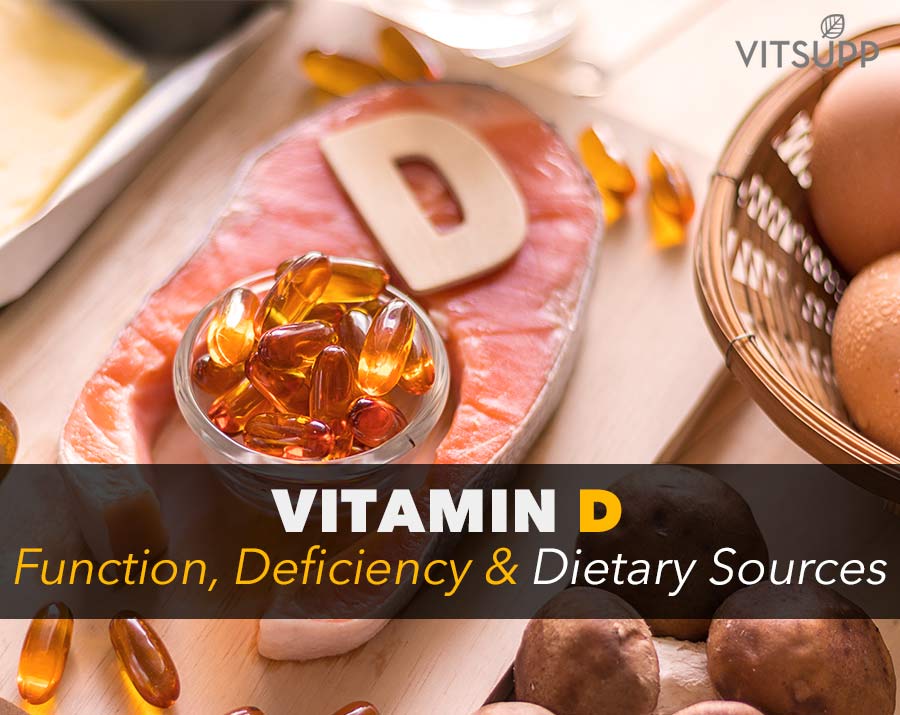We’ve seen several food labels and cosmetic products state that it contains vitamin D, and just like any other nutrient, we know that vitamin D is of some value to the body.
However, did you know that close to one billion people around the world suffer from vitamin D deficiency?
Knowing about the importance of vitamin D, and consciously making an effort to get the required amounts of vitamin D for your body can be highly beneficial for your health. In this article, we tell you everything you need to know about vitamin D, including what happens to your body if you have a deficiency. Read on…
Contents
What is Vitamin D
Vitamin D refers to a group of fat-soluble secosteroids responsible for enhancing intestinal absorption of calcium, iron, magnesium, phosphate and zinc. The most important compounds in Vitamin D group is vitamin D3 (popularly know as cholecalciferol) and vitamin D2 (ergocalciferol).
Why do we need to know about it
It is one of the most important vitamins that are required by your body, Vitamin D is essentially a group of fat-soluble secosteroids. It is produced by your body when you come in contact with sunlight. Additionally, Vitamin D is also found naturally in food and in vitamin D supplements.
It is worth noting that although Vitamin D is more of a prohormone than a vitamin.
Vitamins are essential nutrients that your body requires, which is taken from various external sources like food and supplements. However, in the case of Vitamin D, your body naturally creates it, when and if exposed to sunlight.
Types of Vitamin D
There are two primary forms of vitamin D, vitamin D3 and vitamin D2.
- Vitamin D3 or cholecalcilerol, is formed in the skin upon UV exposure.
- The other, vitamin D2, or ergocalciferol, comes from foods or supplements.
How our body generates Vitamin D3
The cholecalciferol form of vitamin D comes from the conversion of 7-dehy-droxycholesterol to previtamin D3 via UV radiation from the sun. Previtamin D3 is then converted to vitamin D3.
Then this Vitamin D binds with carrier proteins (such as vitamin D binding protein or DBP). Vitamin D3 is then transported to the liver where it is hydroxylated to 25-hydroxyvitamin D3.
The kidneys are stimulated by parathyroid hormone (PTH) to produce 1 ,25-dihydroxyvitamin D3 from circulating 25-hyroxyvitamin D levels.
This conversion can also take place in other cells and tissues (prostate. colon, placenta, bone, macrophages. T-lymphocytes) via cytokine signals.
Physiological Function of Vitamin D
Among the group of compounds found in vitamin D, ergocalciferol (vitamin D2) and cholecalciferol (vitamin D3) are the most important.
This vitamin plays a significant role in the overall functioning of the human body.
Vitamin D3 modulates its effects based on blood calcium levels or physiologic needs. Vitamin D is responsible for Increasing calcium and phosphorus in the blood via internal absorption, bone resorption and renal tubular absorption in the kidney.
For one, it helps maintain good health of your teeth and bones. With the help of Vitamin D, your body can make use of the calcium it gets, for strong teeth and bones.
Secondly, it helps with your immunity and keeps your nervous system and brain in good health.(2)
Vitamin D is also responsible for regulating the levels of insulin in your body and thereby, managing diabetes. Additionally, Vitamin D status in your body plays an important role as far as your cardiovascular and lung health is concerned as well. (3)
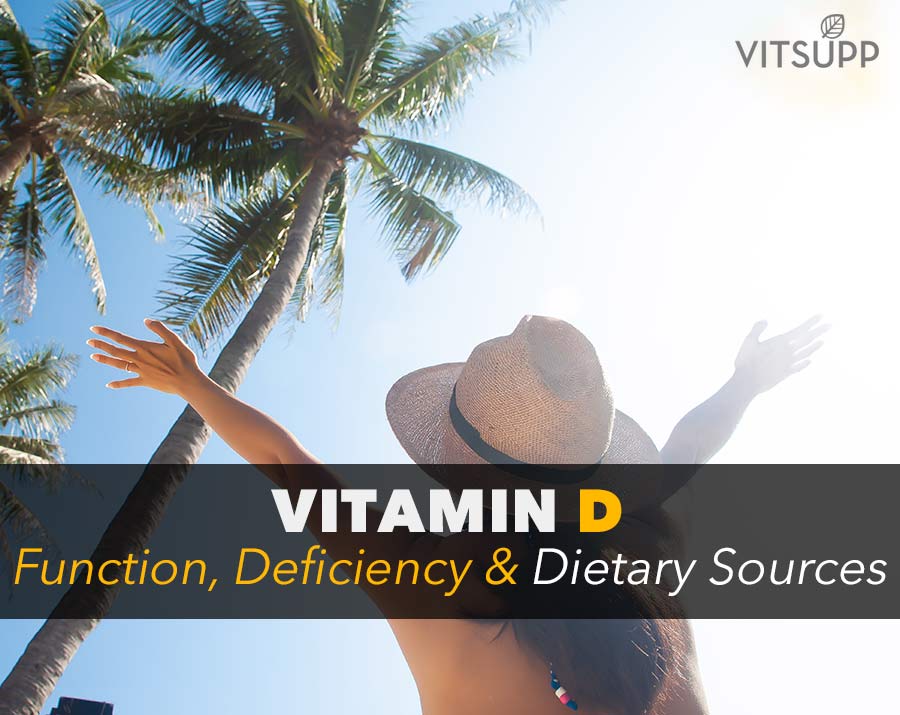
Natural Sources of Vitamin D
Our center of solar system, the Sun is your best source of Vitamin D. That is why it is called the sunshine vitamin. When your skin is exposed to natural sunlight, it makes vitamin D under the skin from cholesterol.
Dietary or food sources of Vitamin D are:
While your body does produce Vitamin D when it is exposed to sunlight, there are other sources of vitamin D as well. Let’s look into these…
Flesh of fatty fish (such as salmon, tuna, and mackerel)
Certain fish, particularly oily fish, contains a high source of vitamin D. Some of these fish include salmon, herring, swordfish, and sardines.
Fish like herring consists of close to 306 IU in each piece of fish, while swordfish consists of around 706 IU in each piece. IU refers to the international unit, which determines the potency of a particular vitamin or hormone.
Consuming one piece of herring or one piece of swordfish, gives you 51 per cent and 117 per cent of the required daily intake (RDA), respectively. (4)
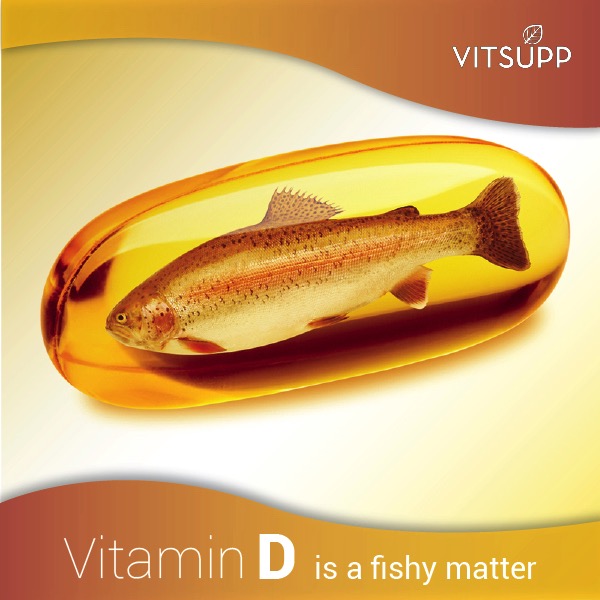
Fish liver oils: rich source of vitamin d
If you are not too fond of fish, then you can incorporate the use of cod liver oil into your diet to get the required intake of vitamin D. It is a rich source of vitamin D, giving you close to 450 IU in each teaspoon.
This is about 75% of the required daily intake that is necessary for your body. In addition to being a rich source of vitamin D, cod liver oil is also an excellent source of Vitamin A.
In fact, one teaspoon of cod liver oil gives you close to 90% of the required daily intake of vitamin A. It is worth noting that cod liver oil also contains high amounts of omega-3 fatty acids.(5)
Beef liver
Cheese
Egg yolks
If you’re wondering that only seafood contains vitamin D, then here’s some good news. Egg yolk is a good source of vitamin D as well. However, there is a catch.
Typically, eggs produced by chickens that are nurtured indoors will contain only around 18 to 39 IU. But if the chickens have been raised outside, then the Vitamin D content in the eggs will significantly increase. It increases to over four times the usual level.
In some cases, chickens are fed with food that is rich in vitamin D. If this is the case, then you will enjoy close to 6000 IU of vitamin D in each yolk. (6)
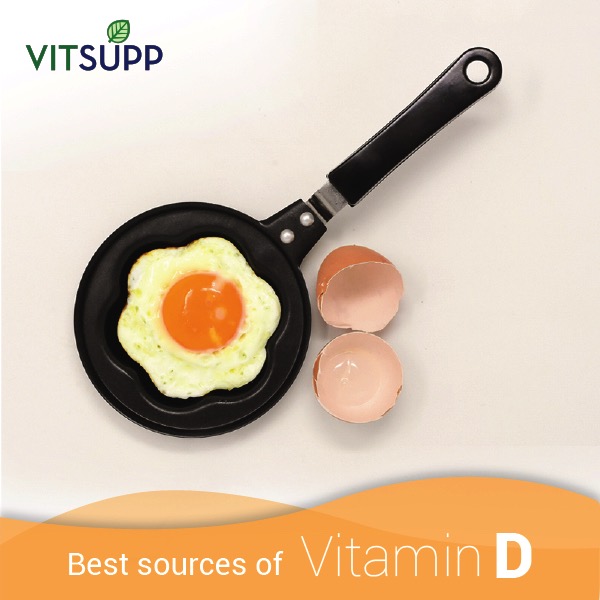
Mushrooms: Vegetarian sources of vitamin d
If you’re a vegetarian and you feel left out, given the above sources of vitamin D, then here’s some good news – mushrooms contain a good source of this prohormone as well.
In fact, mushrooms happen to be one of the only naturally occurring plant sources that contain vitamin D. (7)
This vitamin D is produced in mushrooms in the same way that it is produced in humans, that is, on exposure to sunlight. Which is why it is important to consume mushrooms that have been cultivated in the open and exposed to sunlight.

Best Vitamin D Sources Veg
Wild mushrooms, in particular, have an abundance of sunlight, making them an excellent source of vitamin D, with nearly 2,000 IU of the same in around 100 grams of mushrooms.
Often times, mushrooms that are cultivated commercially and exposed to sunlight will contain close to 130 to 450 IU of vitamin D, in every 100 grams. (8)
Fortified Foods: Vitamin D food sources
In some cases, industries or companies commercially add vitamin D to the food that they sell. Some of these foods include soy milk, cow’s milk, orange juice, breakfast cereals, and oatmeal.
Truth be told, these foods don’t contain as much vitamin D as found in their naturally occurring counterparts, but they do provide around 55 to 130 IU for every serving, approximately. (9)
Vitamin D Deficiency
When your body does not get the required amounts of vitamin D, it can suffer from vitamin D deficiency.
As UV exposure is the primary source of vitamin D for most people. Many populations are showing alarming rates of deficiencies.
There is growing concern over the occurrence of poor vitamin D status. Some prominent vitamin D researchers have identified vitamin D deficiencies as a pandemic.
The lack or deficiency of this pro-hormone can cause several health complications and interfere with the quality of life.
Vitamin D deficiencies are more common in those with limited sun exposure, a low intake of vitamin D, impaired absorption owing to kidney or digestive diseases, or older adults who have a decreased ability to synthesize this vitamin from the sun.
People who are above the age of 65, or those with a skin tone that is on the darker side, are more prone to suffering from vitamin D deficiency. Unfortunately, the symptoms of vitamin D deficiency are quite subtle, so identified this as an issue might be a bit of a hassle. (10)
Most important Vitamin D forms, Cholecalciferol and ergocalciferol can be ingested from the diet and from supplements. The real challenge is that very few foods contain vitamin D. Therefore the most important form of Vitamin D is through supplementation.
Vitamin D Deficiency Causes
There are a few causal factors associated with vitamin D deficiency. Let us look at each of them in detail.
The diet you follow
Sometimes, it’s true when they say you are what you eat. If your diet does not have the adequate amount of vitamin D that your body needs, you might end up suffering from a deficiency of the same.
In case you are following a vegan diet, you need to especially be careful, as a vegan diet does not include seafood, dairy products, or egg yolk, all of which are sources of vitamin D.
Make sure you incorporate vitamin D supplements, to make up for its loss from your diet, if you are vegan. You can also consume mushrooms, to meet the required input of vitamin D. (11)
You are of a darker skin tone
Melanin is the pigment that is responsible for giving the skin its colour. It also gives the eyes and hair its colour. The more melanin in your skin, the darker your skin tone will be.
This pigment also protects your skin from the harmful radiation of the sun. However, melanin can also inhibit your skin’s ability to produce vitamin D. This is observed more in adults who are dark-skinned, as opposed to younger people and children who are dark-skinned. (12)
You aren’t getting enough sun exposure
As we’ve mentioned above, your body, when exposed to sunlight, can produce vitamin D for your body. Now if your exposure to sunlight is limited, chances are that your body is not getting the necessary amount of vitamin D.
Other factors like living in a region that is of a higher altitude, working in a profession that requires you to be indoors for too long, or wearing clothing that covers you from head to toe, might inhibit your exposure to sunlight. (13)
Obesity
Obesity is another major cause of vitamin D deficiency. The fat cells that are present in the body end up absorbing this prohormone, thereby, preventing the blood from using it for circulation.
This way, your body is not getting the required amount of vitamin D. If your body mass index (BMI) is more than 30, then you should know that you are at an increased risk of suffering from vitamin D deficiency, as the vitamin D in your blood levels could be low. (14)
Your digestive system is not absorbing the vitamin
Sometimes, if you are suffering from certain digestive problems and diseases such as celiac disease, Crohn disease, or cystic fibrosis, then chances are that you are suffering from a deficiency of vitamin D, as having a digestive disease is a causal factor.
It can inhibit or interfere with the way your intestines function. When this happens, the ability of your intestines to absorb the vitamin D that is present in the food you eat, gets affected. (15)
Your kidney finds it difficult to process Vitamin D
This is more commonly observed in older adults. Kidney function gets affected with old age, which in turn makes it difficult for these organs to convert the vitamin D that they get from the food they eat to its active form.
When this happens, the body is unable to meet the required amount of vitamin D that it needs. This results in you being deficient in vitamin D. (16)
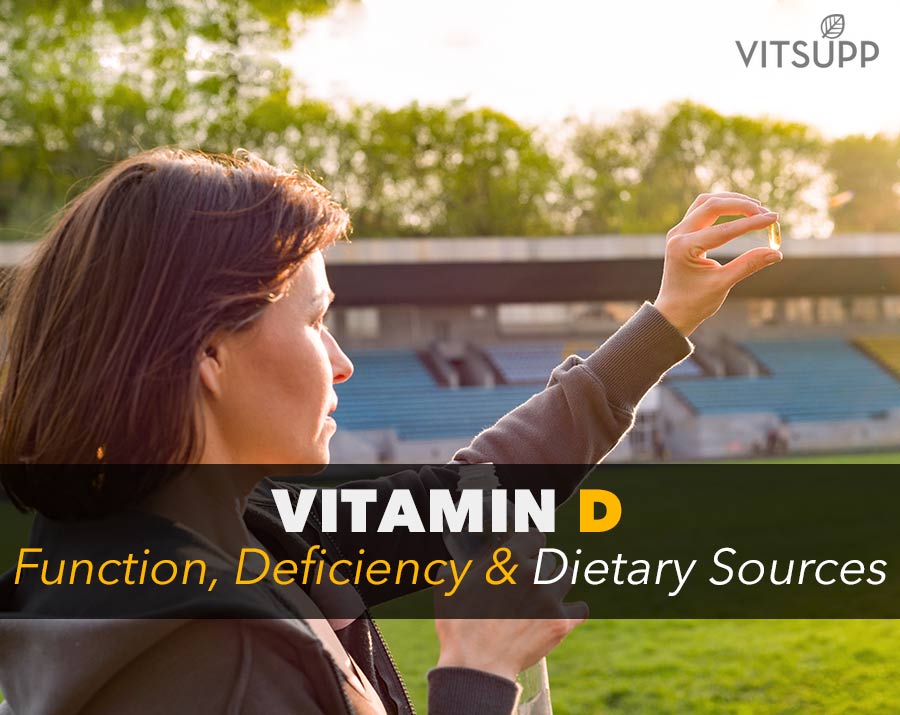
Vitamin D Deficiency Diseases
Diseases caused by deficiency of Vitamin D results are:
- Osteoporosis
- Strong influence on the development of cancer
- Autoimmune diseases, such as insulin-dependent diabetes and multiple sclerosis’4’
Your body requires vitamin D, much like it does other vitamins and minerals. If you do not get the required amount of This prohormone, chances are that you might end up suffering from other health complications and diseases as well.
Bone related disorders are the most common diseases that are related to the deficiency of vitamin D. The lack of this vitamin can lead to bone loss, weakened bones, or porous bones. Osteoporosis is often accompanied by a vitamin D deficiency. It can also lead to osteomalacia in adults. This disorder is characterized by muscle and bone weakness and pain.
A few studies indicated that there could be a possible link between vitamin D and cancer, diabetes, high blood pressure, and multiple sclerosis as well. However, there is insufficient evidence to support this. (34)
Vitamin D Deficiency in Children
The deficiency of vitamin D in children is often associated with rickets. This is a condition that affects the bones in children. Their bones tend to bend or break easily if they are suffering from rickets. (35)

Vitamin D Deficiency Symptoms
Let us now look into the various signs and symptoms of vitamin D deficiency…
You suffer from bone loss
As we mentioned before, Vitamin D helps the body absorb calcium. Calcium is important for your bone health and strength. If your body is not getting the required amount of calcium, it ends up taking calcium from your bones, which in turn can lead to weak bones and bone-related disorders like osteoporosis. If you suffer from bone loss, chances are that your body does not have enough vitamin D that can be used for your body to absorb the necessary calcium. (17)

You suffer from hair fall
Hair loss is often linked to the deficiency of nutrients in the body, like vitamin D. However, there is limited evidence associated with this particular claim.
A deficiency of vitamin D is associated with an autoimmune disease known as alopecia areata. This disease is characterized by hair loss from the head as well as from other parts of the body. (18)
According to one study, vitamin D was topically applied for treatment for hair loss, on a young boy who was suffering from the same. Positive results were observed by the end of this study. It showed that vitamin D could, in fact, treat hair loss. (19)
Wounds and injuries take time to heal
If wounds and injuries are taking time to heal, chances are that there is a lack of vitamin D in your body.
In one study, it was observed that the process of healing, on people who had a dental procedure done, was slow when the levels of vitamin D in the body was at a low. (20)
Additionally, vitamin D can control inflammation. Inflammation can slow down the process of healing, so if there is a lack of vitamin D in the body, chances are that you suffer from inflammation as well, which in turn can compromise the pace at which your body recovers from an injury or wound. (21)
Another study was conducted on patients who were suffering from leg ulcers. On administering them with vitamin D, it was observed that the size of the ulcers, reduced by close to 28%, on an average. (22)
You experience severe back pain
Several studies have indicated that low levels or a deficiency of vitamin D could be associated with back pain. (23)
In one study that was conducted on close to 9,000 women, it was observed that most of their back pain was associated with low levels of vitamin D in the body. (24)
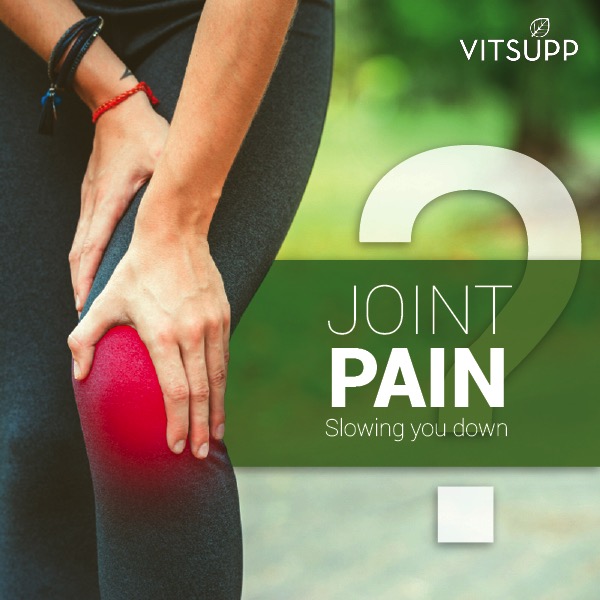
Depression and mood swings
A study was conducted to determine the relationship between vitamin D and depression. It was observed that there is, in fact, a strong link between the two. In one study, vitamin D was administered to patients who were suffering from depression and seasonal depression. An improvement in their condition was observed. However, there is not enough evidence to support the fact that vitamin D can directly impact depression positively. (25)

Unexplained tiredness and fatigue
Tiredness and fatigue can be an indication of several underlying causes, and the lack of vitamin D in your body could be one of these causes.
A few studies suggests that vitamin that fatigue and tiredness are associated with vitamin D deficiency, and in one particular study, vitamin D was administered, after which a considerable improvement was observed. (26)
One particular woman, who complained of chronic tiredness and fatigued all through the day was checked for the level of vitamin D in her body. After which it was noted that it stood at a mere 5.9 ng/ml.
Once she was administered with vitamin D, the level of vitamin D in her body came up to close to 39 ng/ml, which in turn improved her condition. (27)

You’re always falling sick
As mentioned above, vitamin D is beneficial for your immune system. In fact, vitamin D plays an important role in fighting certain bacteria and viruses. In some cases, vitamin D can directly target and interact with infection-causing cells in your body. The lack of hit can impact your immune system in a negative way as well.
So, if you are falling ill too often, chances are that you have a low level of vitamin D in your body.
There have been studies that prove the relationship between vitamin D deficiency and infections in the respiratory tracts, like bronchitis, pneumonia, and cold. (29)
Other studies have been conducted to prove that a regular intake of close to 4,000 IU of vitamin D, can lower your chances of suffering from respiratory tract illnesses. (28)
Assessment of Vitamin D Levels
The most frequently used assay for vitamin D assessment of status is serum 25-hydroxyvitamin D, a combination of both D3 (cholecalciferol) and D2 (ergocalciferol). 25-hydroxyvitamin D is the primary circulating form of vitamin D and the most reliable indicator of its status. It is the most abundant metabolite of the vitamin D and is the direct precursor of its active form.
Insufficient: <75nmol/L or <30ng/mL
Sufficient: 75-250nmol/L or 30-100ng/mL (normal vitamin d level)
Toxic: >250nmol/L or > 100ng/mL
How to get vitamin D
Now that you know the importance of vitamin D for your body, let’s look at the ways in which you can get vitamin D…
1 Get enough exposure to sunlight
There is a good reason why vitamin D is known as the sunshine vitamin. When your body comes in contact with sunlight, a particular type of cholesterol works as a catalyst and helps in the production of vitamin D.
The vitamin D made from the sun stays for the longest time in your body, as opposed to vitamin D that is ingested from various food sources. Getting enough sunlight happens to be one of the best ways for you to get your daily dose of vitamin D. (30)
However, it is worth noting that certain factors like the amount of sunlight your region receives, the kind of clothing you wear, and your age and skin tone, all come into play.
2 Eat fish and seafood that are oily or fatty
Fatty fish and seafood are one of the most excellent sources of vitamin D. Incorporating this into your diet can, to a large extent, give your body the vitamin D it needs.
Certain fish and seafood that are rich in vitamin D are tuna, herring, swordfish, sardines, mackerel, oysters, shrimp, and anchovies. (31)
3 Make sure you have mushrooms
If you’re a vegetarian or if you are not fond of eating fish, then incorporate mushrooms into your diet. Mushrooms make vitamin D the same way that humans make vitamin D, that is, on exposure to sunlight.
So, you will have to buy mushrooms accordingly. Wild mushrooms have a higher level of vitamin D as opposed to commercials cultivated ones. However, there are a few suppliers who treat these mushrooms with sunlight, so you can opt for this as well. (32)
4 Eat your egg yolks and fortified foods
As we’ve mentioned above, eggs are a great source of vitamin D, particularly the yolk. While the outer, whites of the eggs are high in protein, your vitamin D intake will come from the yolk of the eggs.
You can also incorporate fortified foods that contain vitamin D into your diet. A few fortified foods that have vitamin D include soy milk, cow’s milk, certain brands of orange juice, cereals, and yoghurt. (33)
5 Supplementation of Vitamin D
Adult Repletion: 700 – 10,000 IU/Day
Best or most Bio-Available or Active form of Vitamin D
- 1,25-dihydroxyvitamin D3
- 24,25-dihydroxyvitamin D3
- 1,25-dihydroxyvitamin D2
- 25-dihydroxyvitamin D3
- 25-dihydroxyvitamin D2
Calcium tablets with vitamin D
To treat most bone-related conditions, calcium tablets with vitamin D are administered. As we’ve mentioned above, vitamin D is responsible for helping the body absorb enough calcium. Meanwhile, calcium is important for bone and teeth health.
Make sure you consult your doctor and get medical advice before you decide to take any of these supplements by yourself. (36)
In conclusion
Vitamin D is an important nutrient that is required for the good health of your bones, teeth, immune system, cardiovascular system, and lungs.
A deficiency of this pro-hormone can cause a lot of health complications and impact the quality of your life. If you suspect that you are suffering from vitamin D deficiency, consult your doctor at the earliest.
Incorporate vitamin D rich foods like seafood, egg yolks, mushroom, and certain fortified foods to meet the required daily intake of vitamin D. Additionally, make sure that your body gets ample sunlight on a regular basis. This is the best way for you to get vitamin D into your system.

